
 |

|
|
|
|
Height: 5' 17" (age 19) Weight: 150 lbs (age 19) Eyes: blue Marriages: (1) Mildred Agnes Barker, actress (Feb 14. 1922 - ca 1928) (2) (Lily K.) Lillian Boardman, singer & dancer (aft. 1930 - Sep 19. 1953) (her death) no children |
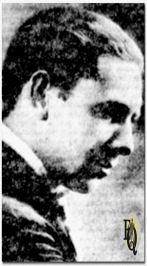 |
|
Above:
Howard Smith - Local Boy Now a Vaudeville Headliner
at the Albee. (The Sunday Tribune, Feb 2. 1922) |
|
|
Howard Irving (Irvine) Smith was born on August 12. 1893 in Attleborough City, Massachusetts, USA to parents George H. Smith, a jeweler and Sybil/Sybelle Pollard.
In Providence "Little Howard" was the boy with the smile that made him the favorite of all
the boys and girls in the Marlborough Avenue - Broad Street neighborhood.
His smile also disarmed all the teachers of Peace Street Grammar and
Technical High School for years.
Also worked as secretary, stock clerk. Smith's hopes of an opera career and
his plans to study in Europe were cut short by the start of World War I. In 1916 he played the piano for Hazel Cox in vaudeville. In trying out a sketch, Miss Cox discovered that her accompanist could also play comedy, and he forthwith stepped into the role of the riding master in her famous white horse riding act; played his first comedy part in vaudeville with Hazel's sister Rae (Ray) Cox. His early appearances on stage, mainly on tour, crowded between variety bookings, established him as a favorite with audiences with fine portrayals.
The first play
The Eternal Magdalene
(48th Street Theatre, Nov 1. 1915 - Jan 1. 1916)
was seen in New York in the
supporting cast for Julia Arthur. We can also confirm his role of John
Bellamy of The Star opposite Eugene Blair in the performance of the
same play at the Brooklyn Grand Opera House, around November 24. 1916. He returned to vaudeville in the first act produced by Lewis and Gordon, under whose management he remained in five different acts. He made his film debut in Young America (Essanay, Sep 1918), a silent movie, as Jack Doray. Directed by Arthur Berthelet the movie was based on the Cohan and Harris production, which made a hit on stage both in New York and Chicago. Around August 1919 his friend Charlie Schofield asked him to play a small part in Lilac Time and some other play - he forgot what - with the Albee Company in Providence. He did accommodate him, but nobody recognized him in the small part and make-up. Howard was part of the opening of Cleveland's winter stock house, "The Prospect", which took place on September 22. 1919 when The Naughty Wife was presented under direction of Cecil Owens. Howard Smith was the lead in And Son, a one-act farce (Vancouver, March 1920). The dialogue was described as extremely bright and full of what was known as "punches." They had met as early as December 1919 on the vaudeville circuit but as of December 1920 Howard also formed a duet with Mildred Barker first in The Honeymoon (1920-21, with Harry L. Hanson). The sketch, written by Aaron Hoffman, is about a young man who marries principally to put himself in a position to curb a certain girl's habit of dictating to him. With a promising start like this, the author and his hero have a world of adventure before them, and what happens is certainly enjoyable. The story has a twist as keen as any written by George Bernard Shaw, with the 'honeymoon' beginning with a 'battle royal'. |
|
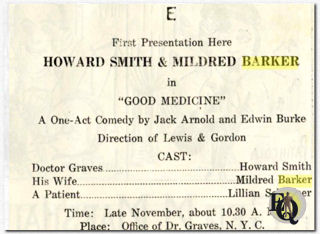 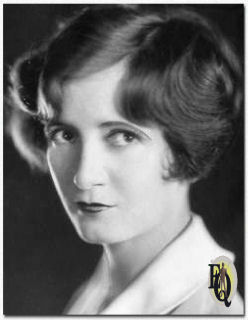 Above left: Sep 1922 add for Howard Smith & Mildred Barker's Good Medicine. Above right: Vaudeville actress Mildred Barker (1929). |
|
|
The Honeymoon was followed by a fast moving, sketch full of laughs and situations called Good Medicine (1921 - Nov 1923). In this skit Howard played Dr. Graves who's client showed every symptom known to medical science. After telling her the truth, that she is all right, the patient, played by Lillian Schaffner, informs the medic that she is the donor of a big hospital... in search for someone to lead it. Mildred played the doctor's wife. Since June 14. 1911 Mildred was married to the actor Roy McNicol (later a well known painter) and on September 9. 1915 their son Roy B. McNicol was born. Mildred's marriage to Roy didn't survive and they divorced prior to 1920. Their son died tragically at 5 years old, after an illness of three days, on January 30. 1921 at the Merchants' Hotel, Johnstown, Pa. Mildred was appearing at "The Majestic", Johnstown, at the time of her son's death. Howard who apparently also performed there wrote another thank-you letter in Vaudeville News in April to everyone who worked at "The Majestic" for supporting Miss Barker. On February 14. 1922 Howard married Mildred Agnes Barker in Manhattan, New York. After the long run of Good Medicine (1921 - Nov 1923, see higher) and a performance in Red, Green and Yellow by Paul Girard Smith they started out in the Keith circuit with a new skit called Curiosity (May - Dec 1924) written by Edwin Burke and produced by Lewis and Gordon it also featured Carlo De Angelo (sometimes replaced by Leslie Adams). Despite it being described as "uproarious comedy concoction of a thousand laughs" in January 1925 reportedly Howard and Mildred were working on a new "1 man, 2 women sketch". Initially, they reached back to their most successful sketch, Good Medicine (Dec 1924 - Feb 1925). However, from April 1925 until at least January 1926, they performed with a new act called Cross-roads. The Fakir (aka The Faker, Dec 1927) was as pretentious offering, which disclosed a humorously related story or the vagaries and perversities of "the fair sex", expounded in five special scenes, each one highly laughable. It presented a distinctively original idea given its full value by excellent acting of Mr. Smith and Miss Barker. They performed together at least until July 1928. |
|
|
The couple
got divorced*
and later Howard remarried Lillian Boardman, a
vaudeville singer/dancer who up to 1930 performed in vaudeville. She had
been a part "Gus Edwards and his Song Revue". With Edwards, Lillian, a
beautiful blonde soprano, and a company of 25 personally developed protégés
appeared in a musical extravaganza during 1910s. They lived in Manhattan. Above: (Second) Wife of Howard Smith, Lillian Boardman in 1922, aged 29 |
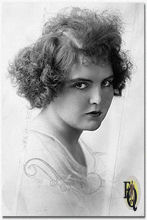 |
|
In 1928, with big-time vaudeville ending, Smith landed a job on radio's popular The Collier Hour (Blue Network, 1928), and received $35 for three minutes work. Howard performed The Fakir (aka The Faker) with Betty Gallagher (who had also performed earlier in Good Medicine) from February 1929 until February 1930 and in March the act was completely taken over by Robert Emmett Keane and Claire Whitney. "Howard Smith and Company" performed The Fakir one last time in vaudeville in late December 1931 at the Harris Theater in Pittsburgh. His radio career continued with The March of Time (CBS, 1931). Smith had plenty of radio work (1934) as the following anecdote describes: "One man has been appearing on two programs at the same time in two widely separated studios. Howard Smith played the court clerk in 'The Court of Human Relations' opening on CBS at 8:30 p.m. He opened court there and sped to Radio City to play a part on the Babe Ruth broadcast from 8:45 to 9 p.m. That gave him time to hustle back to 485 Madison Avenue to close the court program at 9:15 o'clock." Pretty Kitty Kelly was a soap opera broadcast on CBS between March 8. 1937 and September 27. 1940 about a "golden-haired Irish girl" Kitty Kelly (Arline Blackburn) trying to make her way in America. Clayton Bud Collyer was the policeman who befriended her and Howard Smith was Inspector Grady, the Irish police chief who made Kitty's welfare his concern. |
|
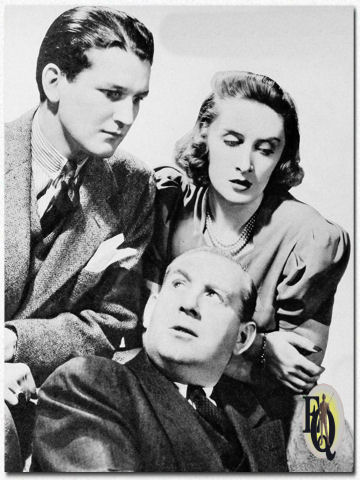 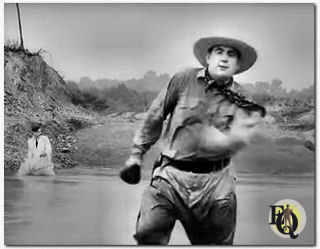 Above left: Photograph by Pinchot, specially posed by Clayton Collyer, Arline Blackburn and Howard Smith, of the Pretty Kitty Kelly air serial. Above right: In 2013, a 'lost' movie by Orson Welles was rediscovered. He directed Too Much Johnson' in 1938. This is a screenshot from the movie where Howard Smith appears as the Cuban plantation owner, Joseph Johnson. |
|
|
Another
Broadway performance for Smith in Miss Quis
(Henry Miller's Theater, Apr 7. - May 8. 1937). Other radio "adventures" were in Thirty Minutes in Hollywood (Mutual, Oct 10. 1937 - Jul 3. 1938), and as chief Brandon in Dick Tracy (NBC-Red, Jan 3. 1938 - May 1938). In this first series, with Ned Wever in the title role, Dick Tracy is out to get an auto hijacking gang headed by a villain whose identity is concealed by a respectable business front. With Dick on the gang's trail, the chief gives orders to his henchman to "get" the sleuth. Smith appears as Cuban plantation owner Joseph Johnson in Welles's rediscovered film Too Much Johnson — slapstick sequences that were to be integrated into a theatre production that was briefly staged in August 1938 before it was shelved. A member of the repertory company of Orson Welles's CBS Radio series The Mercury Theatre on the Air Smith played in "Hell On Ice" (CBS, Oct 10. 1938) and the role of the ill-fated bomber commander in the production of "The War of the Worlds" (CBS, Oct 30. 1938). The Campbell Playhouse, was a sponsored continuation of The Mercury Theatre Howard stayed on the roster in "The Glass Key" (CBS, Mar 10. 1939) and "The Things We Have" (CBS, May 26. 1939). |
|

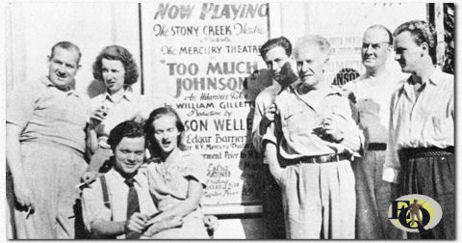 Above: Howard Smith, Mary Wickes, Orson Welles, Virginia Nicolson, William Herz, Erskine Sanford, Eustace Wyatt and Joseph Cotten outside the Stony Creek Theatre during the two-week run of The Mercury Theatre stage production of Too Much Johnson (Augt 16 - 29. 1938). |
|
|
In
radio's
Jane Arden (Blue network, 1938 - 1939) he
played Jack Galloway, a city editor of The Comet-Globe. He was also the first actor to portray Sergeant Velie in the hour-long first radio series The Adventures of
Ellery Queen
(CBS, June 18. - Nov 12. 1939, in 22 episodes) Pictured right: Howard Smith in 1939. |
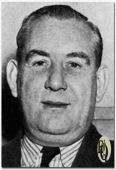 |
|
His radio work
continued with recurring guest roles in Cavalcade of
America (Blue & Red Network, Mar 19. 1940 - Mar 29.
1943 and NBC, Jun 16. 1947 - Feb 26. 1952, 19 episodes),
The Columbia Workshop (CBS, Jul 7. 1940 - Jun 7.
1942, 4 episodes), and Crime Doctor
(Mutual, 1940 -).
In June - July 1942 he did 3 radio episodes for This is Your Enemy (Mutual) produced in co-operation with the War Production Board. He played the role of Will Brown, Homer's father, on radio's The Aldrich Family (1943 - 45) and later reprised the role on the NBC television series (1949 - 1953). Arthur Hopkins Presents, was a well-done dramatic anthology series, the equal to, The Lux Radio Theatre, except for Arthur Hopkins as the host. Howard was in "Our Town" (NBC, Apr 19. 1944) the first show of the series and again a few months later in "Beyond the Horizon" (NBC, Nov 1. 1944). Between radio commitments he had appeared on Broadway in Solitaire (Plymouth Theatre, Jan 27. - Feb 14. 1942), The Life of Reilly (Broadhurst Theatre, Apr 29. - May 2. 1942), Manhattan Nocturne (Forrest Theatre, Oct 26. - Nov 13. 1943), Decision (Belasco Theatre, Feb 2. - Jun 17. 1944) and the hit Dear Ruth (Henry Miller's Theatre, Dec 13. 1944 - Jul 27. 1946). |
|
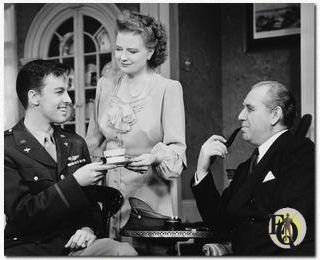 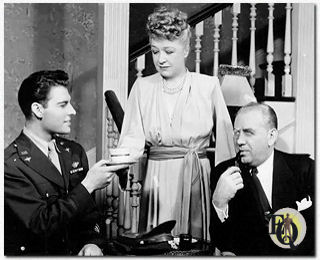 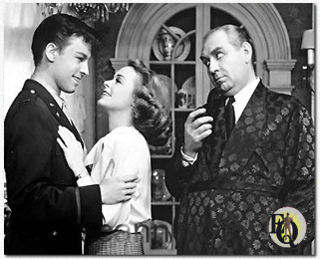 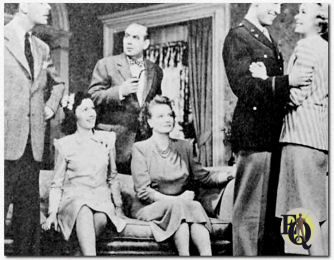 Four photos from the play Dear Ruth (Henry Miller's Theatre, Dec 13. 1944 - Jul 27. 1946) Top left: John Dall as Lt. William Seawright, Phyllis Povah as Mrs. Edith Wilkins and Howard Smith as Judge Harry Wilkins. Top right: Again John Dall and Howard Smith, with Helen McKellar between them (she replaced Phyllis Povah in the role of Mrs. Wilkins). Above left: John Dall with Virginia Gilmore (who was married to Yul Brunner) as Ruth Wilkins and Howard Smith. Above right: (L-R) Barlett Robinson, Kay Coulter, Howard Smith, Phyllis Povah, John Dall and Virginia Gilmore. |
|
|
In 1944 former NY stage producer Murray Phillips' widow Lucille
Phillips (né Arnold), fell head over heels in love with an actor, Howard
Smith.
Physically Howard, with his portly belly, towered over Lucy. Her daughter
Peggy describes him in her memoirs: "Huge and genial, with a deep rumbling laugh, Smith's talent commanded high respect in theatrical circles. Coming from a vaudeville background he had mastered a comedic sense of timing that was the envy of all his peers. With his bright blue eyes, shock of white hair and baby-smooth skin, he resembled a robust, beardless Santa Claus. Howard adored my mother, and she him. They danced the night away to Eddie Duchin's music at the Astor Hotel Roof, went for Sunday drives in the country, and savored gourmet candle-lit dinners. The romance progressed and in December of 1949, Howard had been offered leading roles in two new plays slated for Broadway. One was a comedy, and because most of his successes had always been in comedies, he was pre-disposed to accept that play over the other which was a drama "Death of a Salesman". Before choosing, however, he brought both scripts home to Lucille and asked her to have me read them. By then I had achieved a fairly respected reputation in the theatre as a press representative and writer." He appeared in The Theatre Guild On The Air (aka The United States Steel Hour) in both "Mornings At Seven" (ABC, Nov 25. 1945) and "The First Year" (ABC, Mar 23. 1947). As a balding, heavy-set American character actor, he relocated to Hollywood in 1946 and specialized in judges, police officers, corporate bigwigs and assorted choleric authoritarians. In the following years he made the following movies: Her Kind of Man (Warner, May 11. 1946), Kiss of Death (20th Century-Fox, Aug 13. 1947), Call Northside 777 (20th Century-Fox, Feb 13. 1948), State of the Union (MGM, Apr 30. 1948), and Street with No Name (20th Century-Fox, Jul 4. 1948). However Broadway tried to lure him back to the East Coast with Mr. Peebles and Mr. Hooker (Music Box Theatre, Oct 10. - 12. 1946) and The Magic Touch (International Theatre, Sep 3. - 13. 1947) both with little success. |
|
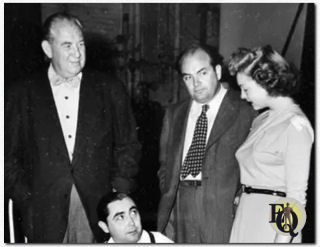 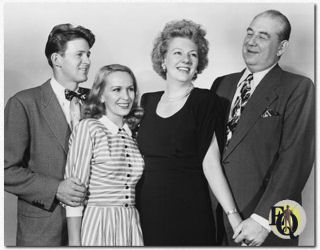 Above left: 1946 rehearsal for Mr. Peebles and the Mr. Hooker standing next to Howard Smith (L), Rhys Williams and Randee Sanford (R). Above right: The Magic Touch (1947) From L to R: William Terry as Jeff Turner, Sara Anderson as Cathy Turner, Frances Comstock as Amy Thompson and Howard Smith as J. L. Thompson. The production opened September 3. 1947 and closed after only twelve performances. |
|
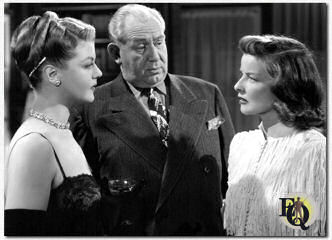 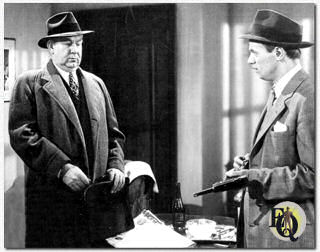 Above left: State of the Union (MGM, Apr 30. 1948) is an American drama film directed by Frank Capra about a man's desire to run for the nomination as the Republican candidate for President, and the machinations of those around him. Left to right: Angela Lansbury, Howard Smith and Katharine Hepburn. Above right: Street with No Name (20th Century Fox, Jul 4. 1948) with (L-R) Howard Smith and Richard Widmark. |
|
|
Hazel was played by Shirley Booth and her initial supporting cast for radio's Hogan's Daughter
(NBC Jun 21. - Sep 14. 1949) featured Howard Smith as her father.
Later
(1961) in the television version of that same program, now
named Hazel, Howard was
introduced as Harvey Griffin, a frequent client of George and Hazel's law
firm. When film director Kazan reached out for Howard Smith for a role in his play Death of a Salesman it seemed to many that he had reached out into what seemed the totally wrong direction. A shouting comic who played in farces where he played the standard bewildered father of teenage girls. Howard read the play and refused the part, surely the best he had ever been offered in his life. Kazan,... tried to change his mind. "That play is terrible," he'd say. "Who's going to want to see something that sad?" Finally a meeting was fixed with Howard and Arthur Miller. Miller, pretending ignorance asked him to tell him why he was so against the play. "That poor man, for God's sake; the rotten things his sons say to him and his boss. Everybody's so down on him. It's just awful!" "Except Charley," Miller replied and he could see Smith's eyes change. He stopped moving. "Charley gives Willy good advice, lends him money, always makes time for him during office hours... Charley really tries, Howard." Howard sat there staring. Finally he said, "I'll think about it." That night he accepted the role. His instinct were as right for it as his personality. |
|
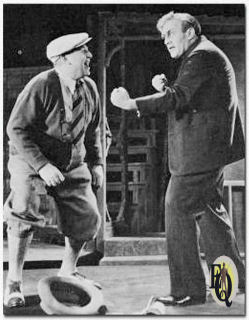 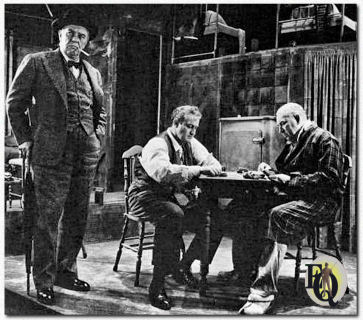 Above: The original Broadway production of Death of a Salesman (Morosco Theatre, Feb 10. 1949 - Nov. 18 1950). Left: (L-R) Howard Smith and Lee J. Cobb Right: (L-R) Thomas Chalmers, Lee J. Cobb and Howard Smith |
|
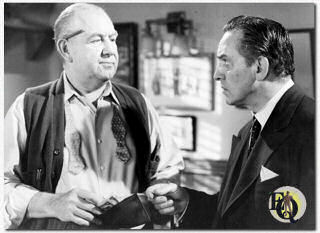 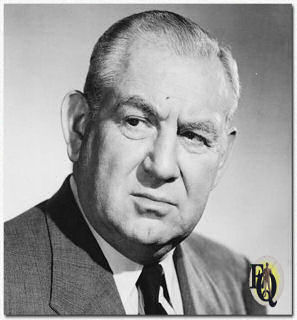 Above left: Howard Smith (L) with Fredric March in Death of a Salesman (Columbia, Dec 20. 1951). Above right: Howard Smith in a 1951 promotional photo for Death of a Salesman. |
|
|
So Smith created the role of
Charley in the original Broadway production of Death of a Salesman
(Morosco Theatre, Feb 10. 1949 - Nov. 18 1950) but he may be best remembered for his
recreation of the role in the 1951 screen version. The success of Death of a Salesman generated lots of work, both as guest star in several TV series but also on Broadway: Mid-summer (Vanderbilt Theatre, Jan 21. - Apr 25. 1953), The Pink Elephant (Playhouse Theatre, Apr 22. - 25. 1953), A Red Rainbow (Royale Theatre, Sep 14. - 26. 1953), Anniversary Waltz (Apr 7. 1954 - Sep. 24. 1955). On September 19. 1953 (during the run of A Red Rainbow!) Lillian known to the stage as Lillian Boardman passed away in New York, aged 60. |
|
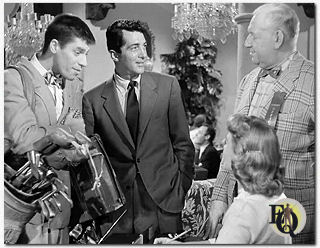 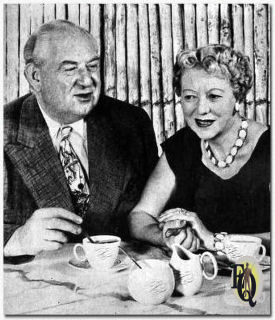 Above left: The Caddy (York Pictures, Aug 10 1953) with (L-R) Jerry Lewis, Dean Martin, Barbara Bates, and Howard Smith (as golf official). Above right: The Second Mrs. Burton was heard over CBS Radio with Patsy Campbell as Terry Burton, Dwight Weist as Stan Burton, Ethel Owen (R) as Mother Burton, and Howard Smith as Buck Halliday. "Behind Mother Burton's haughty veneer has always been the fear of a lonely old age. Now, this fear vanishes as she plans her marriage to bluff, flamboyant Buck Halliday." (1955) |
|
|
First Love was an American soap opera which ran on NBC Daytime TV
from July 5. 1954 to December 30. 1955. Although short-lived it had 388 (15
minutes) episodes. Howard played judge Kennedy. The Gang's All Here (Ambassador Theatre, Oct 1. 1959 - Jan 23. 1960) another Broadway performance. In the cast was also Bill Zuckert (of EQ interest!). |
|
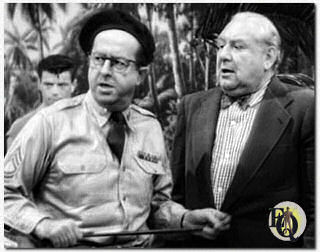 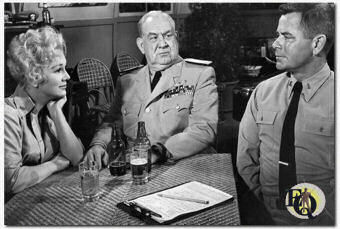 Above left: The Phil Silvers Show had Howard as guest in the episode "Hollywood" (CBS, Jan 3. 1956) Above right: Eva Gabor, Howard Smith and Glenn Ford in Don't Go Near The Water (MGM, Nov 14. 1957). |
|
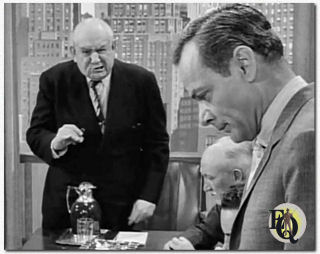 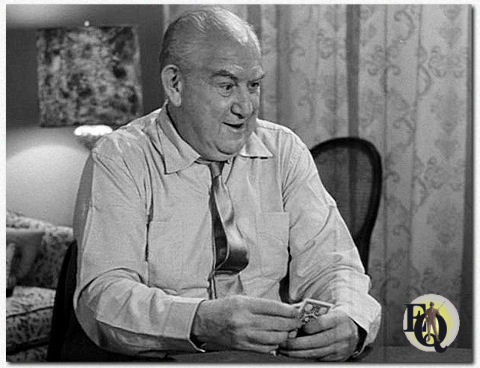 Above left: Smith in The Twilight Zone first-season episode, "A Stop at Willoughby" (1960). Rod Serling wrote the script, bedeviled by the CBS Brass, it almost seemed like he was trying to make a point as was stated by actor Jason Wingreen: "He made Howard Smith, who played the boss, a really miserable being." Above right: The Naked City episode "Debt of Honor" (Shelle, Screen Gems, Nov 23. 1960), opens on a poker game, in which the dealer was played, without credit, by Howard Smith. |
|
|
On television, Smith played the overbearing boss Oliver Misrell in The
Twilight Zone first-season episode, "A Stop
at Willoughby" (CBS, May 6. 1960) where
angered by the loss of a major account he drove James Daly near crazy with
the lecture, "You need to PUSH PUSH PUSH them!". He also appeared in the
third season
episode, "Cavender Is Coming" (CBS, May 25. 1962) starring a young Carol Burnett. In 1962 he was
also cast in the Perry Mason
sixth season (CBS, Nov 8. 1962) episode, "The Case of the Unsuitable Uncle",
as character Frank Warden. Peter Loves Mary was an American situation comedy starring Peter Lind Hayes and Mary Healy which centered around a show-business couple and their family who move from New York City to the suburbs. (NBC, Oct 12. 1960 - May 31. 1961). Howard appeared as Horace Gibney, Mary's father (6 episodes). Based on the earlier radio series Hogan's Daughter (see higher) he was a recurring guest in TV series Hazel (Screen Gems, Oct 12. 1961 - Mar 11. 1965), where, during the first 4 seasons, he made no fewer than 27 appearances as George Baxter's gruff client Harvey Griffin. |
|
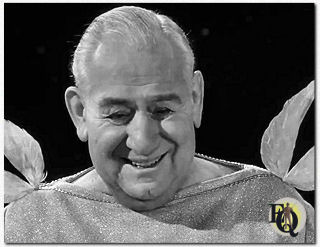 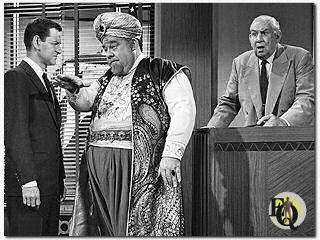 Above left: Howard also appeared as angel in the 1962 Twilight Zone episode, "Cavender Is Coming". Above right: Tony Randall, Burl Ives and Howard Smith in the movie The Brass Bottle (Universal, Feb 13. 1964). |
|
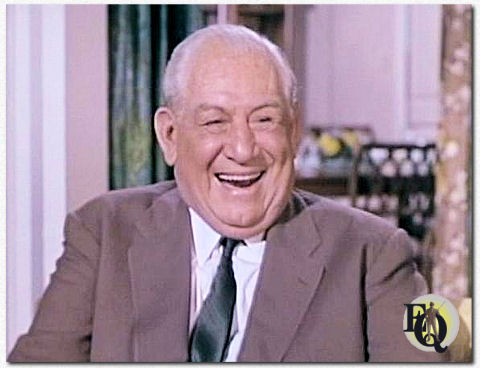 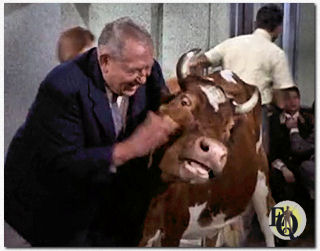 Above left: Howard in Hazel (in "Hazel's Inquisitive Mind", Screen Gems, Mar 11. 1965). Above right: "The Corn Is as High as a Guernsey's Eye" (Jan 26. 1967) an episode from the popular Bewitched series had Howard Smith (as C.L. Morton) opposite an unusual, uncredited, co-star! |
|
|
From June - July 25. 1964 he was a replacement for the
role of "R.H. Macy" in Here's Love (Shubert Theatre,
Oct 3. 1963 - Jul 25. 1964). His last appearance on a Broadway stage. His last appearance on TV was in the pilot for The Hardy Boys. ("The Mystery of the Chinese Junk", 20th Century-Fox, Sep 8. 1967) Smith died on January 10. 1968, in a Hollywood hospital, following a heart attack. He was cremated and buried, next to his wife Lillian, at Kensico Cemetery in Valhalla, New York. |
|
|
Notes: * Mildred Agnes Barker married a third time to Stirman Marvin Meek on November 28. 1933. ** Some sources, including the excellent Radiogoldindex, list everything by name. Howard Smith is a fairly common name. The Howard Smith appearing in the referenced The Garry Moore Show was actually the Howard Smith Orchestra, and there are also listings for Howard Smith (Representative, Virginia). As it appears neither have anything to do with "our" Howard Smith. All dates for movies are for the first US release. All dates for TV programs are original first airdates. All dates for (radio) plays are for the time span the actor was involved. Facts in red still need confirmation. |
|
|
Click on Uncle Sam if you think you can help out...!
|
|
|
Other references |
|
|
This actor profile is a part of
Ellery Queen a website on deduction.
The actor above played Velie in the 1947
radio series of The Adventures of
Ellery Queen.
Click Uncle Sam if you think you can help
out...! Many of the profiles on this site have been compiled after very careful research of various sources. Please quote and cite ethically! |
|
|
Page first published on Sep 1. 2017 Version x2.1 - Last updated April 24. 2025 |
|
 b
a c k
t o L i s t o f S u s p
e c t s
b
a c k
t o L i s t o f S u s p
e c t s
|
|
| Introduction | Floor Plan | Q.B.I. |
List of Suspects | Whodunit? | Q.E.D. | Kill as directed | New | Copyright Copyright © MCMXCIX-MMXXV Ellery Queen, a website on deduction. All rights reserved. |